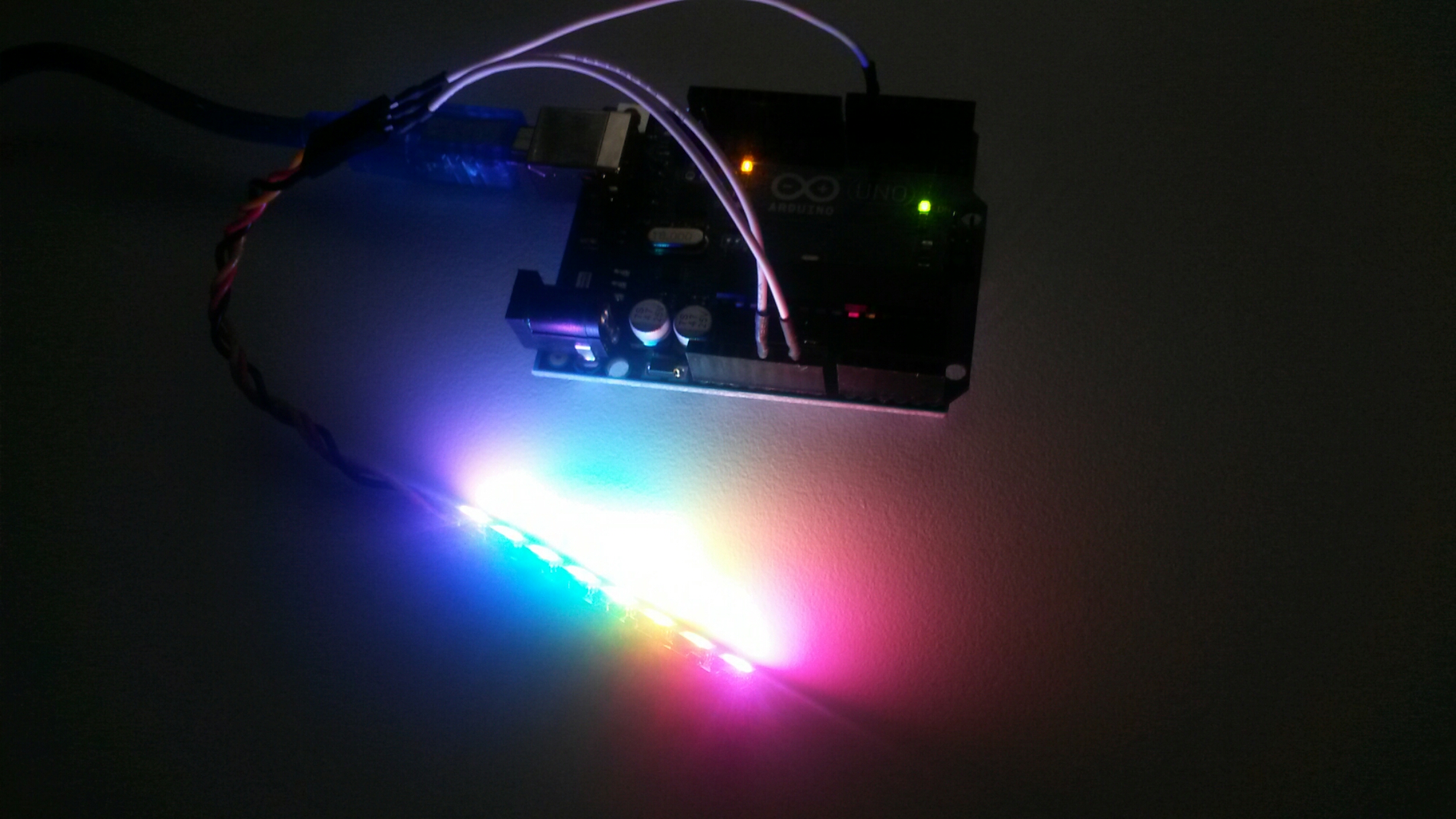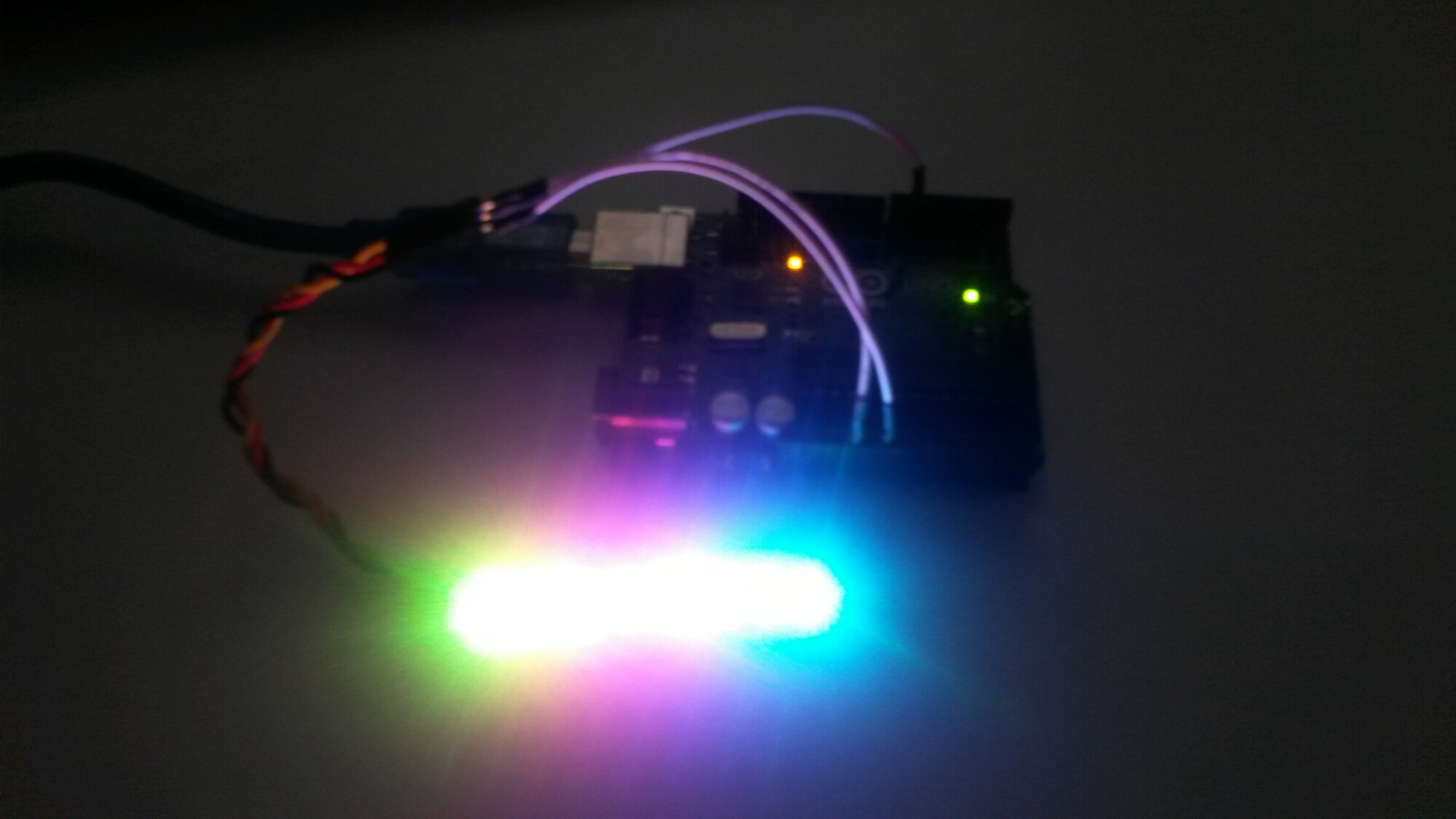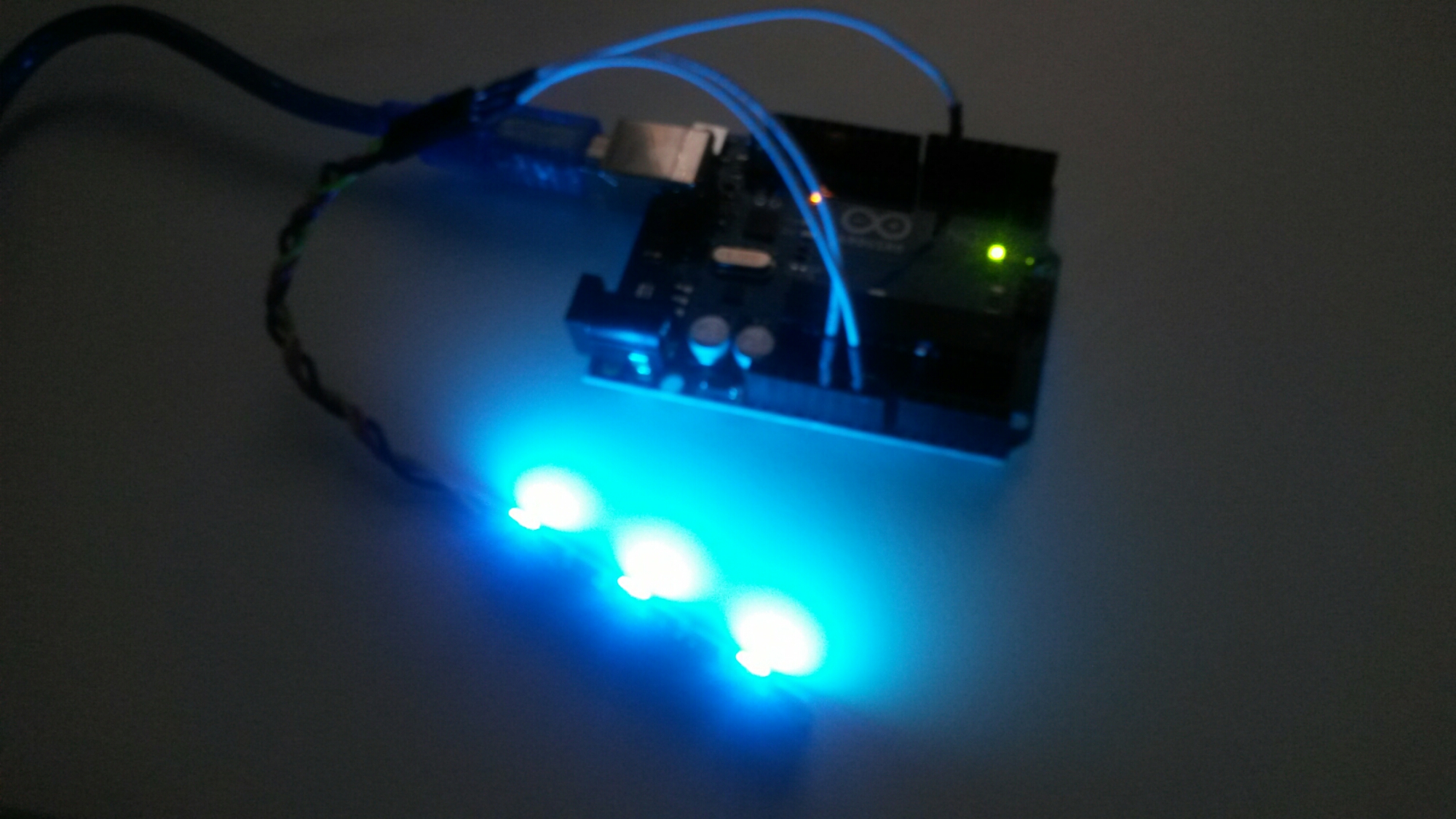RGB LEDs are awesome – especially the new, fancy ones with the WS2812 RGB LED driver. These LEDs can be individually controlled to display red, green, and blue, but interfacing them with a microcontroller or computer.
To test controlling WS2812 RGB LEDs I bought a cheap addressable LED strip. An addressable RGB LED strip is a long flexible strand of LEDs each of which can be individually set to a certain color (hence: addressable). By varying the level of red, green and blue (RGB) per LED many color combinations can be made. Addressable LED promise is to be an easy way to add complex lighting effects to any project. WS2812 neopixels are addressable RGB LEDs. The integrated controller chip allows you to change the color of the LED and address each individual LED. ThoseWS2812 LEDs are powered with 5V – 7V power source (60 mA power consumption) and are controlled through a serial bus (one control signal).
I planned to use either Arduino or ESP8266 to control those LEDs. After some looking on vailable examples and technical data on the LEDs, I planned to use Arduino (Arduno Uno), because it’s 5V power and 5V logic level is directly suitable. And there are many Arduino tutorials for WS2812.
To get easy start, I planned to follow instructions fro Arduino Addressable LEDs & Splendid Projects page. That page had an example source code that looked to be useful and simple wiring instructions.
In the first test I fould out that in addition to the source code I also needed NeoPixel Arduno library. So I needed to get the library from https://github.com/adafruit/Adafruit_NeoPixel and install it according to instructions. After downloading, I had to rename folder to ‘Adafruit_NeoPixel’ and move it to Arduino Libraries folder. After restarting Arduino IDE , I opened File->Sketchbook->Library->Adafruit_NeoPixel->strandtest sketch example file. This worked well. I also tried the original code fromArduino Addressable LEDs & Splendid Projects page which I modified to use 8 LEDs instead of one. Both examples made a “random” color light show on my LED strip. Enough for first testing.




299 Comments
Tomi Engdahl says:
This LED Rave Mask Has Burning Man Written All Over It
https://www.hackster.io/news/this-led-rave-mask-has-burning-man-written-all-over-it-0ea67e9cdf66
Armaiz Ardenwala’s Arduino-powered, light-up mask is made up of 161 NeoPixels.
Tomi Engdahl says:
The Arduino-Compatible Music Visualizer Makes Music Beautiful Courtesy of an RGB LED Strip
https://www.hackster.io/news/the-arduino-compatible-music-visualizer-makes-music-beautiful-courtesy-of-an-rgb-led-strip-8847bee02c18
Built around an ATmega328P microcontroller, Koko’s latest build turns up to 255 RGB LEDs into a sound-reactive visualizer.
Tomi Engdahl says:
An Over-Engineered(?) Arc Shaped LED Lamp
Ronny Ziss’ addressable LED lamp is beautiful, adjustable, and includes a colorful Easter egg.
https://www.hackster.io/news/an-over-engineered-arc-shaped-led-lamp-e874203f0447
Tomi Engdahl says:
udpx
udpx is is a technology to transport data over WiFi to microcontrollers, supporting decompression
https://hackaday.io/project/169303-udpx
View Gallery
427
1
3
4
Team (2)
Martin FasaniMartin Fasani
Hendrik PutzekHendrik Putzek
Join this project’s team
udpx
udpx android application
Sponsored by CALE Eink display manager
Software
ongoing project
ESP32 Addresable leds LED stripe
Related lists
Espressif
Things that are created using Espressif boards
This project was created on 01/04/2020 and last updated 17 days ago.
Description
udpx can be used to receive frame by frame animations generated by any UDP client application- Receive over the air Video frames- Be used as a Protocol base for a different mission like send on real time information from sensorsTarget board is ESP32. Any board of this type will do the job. ESP822 is supported in subproject Remora but without compression. Video presentation https://www.youtube.com/watch?v=feGacaxcCXQ
Tomi Engdahl says:
https://hackaday.com/2020/02/20/counter-strike-gets-the-rgb-led-treatment/
Tomi Engdahl says:
https://hackaday.com/2020/03/13/led-shirt-does-it-with-tulle/
Tomi Engdahl says:
This DIY RGB Value Interpreter Will Help You Dial in Your LED Colors
https://www.hackster.io/news/this-diy-rgb-value-interpreter-will-help-you-dial-in-your-led-colors-152b032c557d
Thomas Burns’ device takes the guesswork out of determining which 0-255 RGB value corresponds to the color you want in your project.
Tomi Engdahl says:
Flame Simulation
Vertical flame simulation for the Arduino MKR RGB Shield.
https://create.arduino.cc/projecthub/hatschibratschi/flame-simulation-916431
Tomi Engdahl says:
The Table Tennis Ball-Ball Is an LED-Lit Work of Art
https://www.hackster.io/news/the-table-tennis-ball-ball-is-an-led-lit-work-of-art-25ffd8c1762b
Thomasj152 took advantage of the light diffusion of ping pong balls to build a Table Tennis Ball-Ball that makes for quite the art piece.
Tomi Engdahl says:
Super-Simple Music Spectrum Visualizer © GPL3+
A breadboard-friendly music visualizer using a microphone and LED strip.
https://create.arduino.cc/projecthub/AlexWulff/super-simple-music-spectrum-visualizer-c99971
Tomi Engdahl says:
Andy Warburton designed a 3D-printed macropad with Seeed Studio’s Seeeduino XIAO and CircuitPython.
These Beautiful Blinkenlight Earrings Shimmer and Shine with a Light That’s Just Oh So Fine!
https://www.hackster.io/news/these-beautiful-blinkenlight-earrings-shimmer-and-shine-with-a-light-that-s-just-oh-so-fine-48755eba5c91
Some careful component choices cram maximum blinky into these eye catching illuminated earrings from Sawaiz Syed.
Tomi Engdahl says:
Tips and tricks for driving WS2811 LED strips – Part 1: Taming the wily WS2811
https://www.edn.com/tips-and-tricks-for-driving-ws2811-led-strips-part-1-taming-the-wily-ws2811/
There are several types of LED strips but this article will focus on driving LED arrays which use WS28114 and WS28124 driver chips. This is in part because products like Adafruit’s NeoPixel strips which use them tend to be less expensive than similar products which use LPD8806 drivers.
Tomi Engdahl says:
Solving Automotive Interior Lighting Challenges with Integrated Smart Embedded LEDs
https://www.electronicdesign.com/markets/automotive/article/21132785/solving-automotive-interior-lighting-challenges-with-integrated-smart-embedded-leds?utm_source=EG+ED+Auto+Electronics&utm_medium=email&utm_campaign=CPS200601033&o_eid=7211D2691390C9R&rdx.ident%5Bpull%5D=omeda%7C7211D2691390C9R&oly_enc_id=7211D2691390C9R
As the ISELED Alliance drives the development of next-gen smart integrated automotive interior lighting solutions, system developers are using MCUs to fully realize the technology’s benefits and innovation opportunities.
The ISELED Alliance created a new type of calibrated, digitally addressable smart RGB LED module that’s integrated with a smart LED driver, otherwise referred to as an ISELED. Adding even the smallest, most simple 8-bit microcontroller (MCU) to this ISELED device enables it to be implemented exclusively in hardware without any software or CPU burden from the processor, while opening the door to new applications and innovation opportunities using a flexible, building-block design approach.
https://iseled.com/
Tomi Engdahl says:
https://hackaday.com/2020/06/10/a-levitating-lamp-without-magnets/
Tomi Engdahl says:
https://hackaday.com/2020/06/10/light-up-the-night-with-a-tetrahedral-led-hat/
Tomi Engdahl says:
https://hackaday.com/2020/05/18/jumbo-led-matrix-brings-classic-sprites-to-life/
Tomi Engdahl says:
https://create.arduino.cc/projecthub/user0448083246/from-pixel-to-neopixel-6a49fd
Tomi Engdahl says:
By mapping the physical location of each individual LED, this project lets you display patterns without untangling anything.
Atomic14′s ESP32-CAM Hack Sorts Out the WS2118 LED String Tangle Well Ahead of the Holidays
https://www.hackster.io/news/atomic14-s-esp32-cam-hack-sorts-out-the-ws2118-led-string-tangle-well-ahead-of-the-holidays-9811874d5055
By mapping the physical location of each individual LED, Atomic’s project lets you display patterns without untangling anything.
The software is available on Atomic’s GitHub repository, and requires only Python 3, Node.js, and Yarn on the host computer
https://github.com/atomic14/self-organising-leds
Tomi Engdahl says:
Controlling NeoPixel Ring using Arduino in Tinkercad. Follow this page for more. Watch full video.
https://youtu.be/FaP7d4toV7s
Tomi Engdahl says:
This custom, ESP8266-controlled mask is capable of displaying countless colors and patterns using 104 RGB LEDs.
Protect Yourself From COVID-19 in Style with the NeoPixel LED Face Mask
https://www.hackster.io/news/protect-yourself-from-covid-19-in-style-with-the-neopixel-led-face-mask-dc762041aab08
Albert Barber designed his face covering using 104 RGB LEDs, an ESP8266, and 3D-printed parts
Tomi Engdahl says:
Arduino WS2812 Color Animation Examples
I uploaded sample files to my github account. For technical information
Arduino WS2812 Color Animation Examples © LGPL
Let’s make applications with WS2812 RGB led.
https://create.arduino.cc/projecthub/altium_designer_projects/arduino-ws2812-color-animation-examples-a311e8
Tomi Engdahl says:
Though It Looks Like COVID-19, There’s No Need to Fear — Come and Play with the Wobble Sphere!
https://www.hackster.io/news/though-it-looks-like-covid-19-there-s-no-need-to-fear-come-and-play-with-the-wobble-sphere-f46e6be882b9
We take a look under the hood of the Wobble Sphere — from Robin Baumgarten — and learn a thing or two about large-scale LED installations!
Baumgarten has a development website, where he documents his work, so there’s no need to guess our way through the construction of this light emitting orb!
The project logs for his various works make for some excellent reading and reference material for any budding visual and interactive installation artists in the crowd.
https://wobblylabs.com/projects/wobblesphere
Tomi Engdahl says:
RGB Minecraft Sign Isn’t Just For Looks
https://hackaday.com/2020/07/24/rgb-minecraft-sign-isnt-just-for-looks/
This laser cut and LED illuminated version of the Minecraft logo created by [Geeksmithing] looks good enough to occupy a place of honor on any gamer’s shelf. But it’s not just decoration: it can also notify you about your Minecraft’s server status and tell you when players are online by way of its addressable LEDs.
https://github.com/geeksmithing/MinecraftFriendNotificationSystem
Tomi Engdahl says:
Would you like to learn WebSocket technology with ESP32?
With this project, you will learn the perfect harmony of Arduino, ESP32, SPIFFS, WS2812, AsyncWebServer, WebSocket, Javascript technologies.
WS2812 Project with Websocket Technology © GPL3+
Let’s learn Websocket technology with ESP32
https://create.arduino.cc/projecthub/altium_designer_projects/ws2812-project-with-websocket-technology-45ad41
We can program the ESP3212 board with the Arduino IDE software. This link contains the necessary information.
https://randomnerdtutorials.com/installing-the-esp32-board-in-arduino-ide-windows-instructions/
Tomi Engdahl says:
For those of you who enjoy a piece of furniture with a bit of flair, this end table is for you.
This Sound-Reactive Infinity Cube End Table Will Put You in a Trance
https://www.hackster.io/news/this-sound-reactive-infinity-cube-end-table-will-put-you-in-a-trance-e599fb4f059d
Looking for a piece of furniture with a bit of flair? We’ve got just the thing for you.
https://www.instructables.com/id/LED-Infinity-Cube-End-Table/
Tomi Engdahl says:
https://hackaday.com/2020/09/10/surfboard-led-strips-light-up-the-waves/
Tomi Engdahl says:
Flexball Is a Flexible PCB Ball with 100 LEDs and WiFi
https://www.hackster.io/news/flexball-is-a-flexible-pcb-ball-with-100-leds-and-wifi-aa28c4ceeb32
This flexible PCB ball features an ESP8285-01F, WS2812 2020 addressable LEDs, and an ADXL345 accelerometer.
Tomi Engdahl says:
https://tutorials-raspberrypi.com/connect-control-raspberry-pi-ws2812-rgb-led-strips/
Tomi Engdahl says:
Continuum – Slow Motion LED Art Display
https://hackaday.io/project/174816-continuum-slow-motion-led-art-display
Ambient LED artwork created by playing an animated GIF in extreme slow motion with high LED refresh rate, and interpolation between frames.
Continuum is a light art display that is continuously in motion, with options to move quickly, slowly, or incredibly slow. The RGB LEDs in the display are updated 240 times per second, with unique colors calculated each update. A slider on the side of the display controls if the LEDs play back the content – currently Animated GIFs – in realtime, 1000x slower than realtime, or anywhere in-between.
The frame is powered by the Teensy 4.1, and the SmartMatrix Library, using the SmartLED Shield for Teensy 4. The LEDs are HUB75 panels tiled to make a 96×96 pixel 480mm (18.9″) square display that fits into a shadowbox frame. The panels are refreshed at 240Hz, with new LED content interpolated between the previous and upcoming frames in the GIF animation. This wouldn’t be possible without the powerful Teensy 4, which has enough memory to store the additional pixel data and do all the computation necessary to calculate unique pixels for a 96×96 HUB75 display and refresh at 240Hz
Tomi Engdahl says:
Difficult to print, easy to watch!
These geodesic RGB LED spheres are absolutely stunning
https://blog.arduino.cc/2020/09/21/these-rgb-led-geodesic-spheres-are-stunning/
While this project took him over 100 hours to complete, creator Whity claims that his glowing geodesic domes were worth the effort. As seen below, each dome is able to light up its triangular faces, using via WS2812B programmable LEDs embedded inside. The effect is mesmerizing on video, and has to be even more so in person.
Tomi Engdahl says:
https://hackaday.com/2020/08/05/rgb-led-shutter-shades/
Tomi Engdahl says:
From
https://www.facebook.com/groups/electronichobycircuits/permalink/3645895282101821/
Hi everyone! Here I show you a LED Matrix that I made with the WS2812 addressable LEDs and the ESP8266 (ESP-01), with a PCB designed in the free software “EasyEDA” and manufactured by [https://jlcpcb.com](https://jlcpcb.com/) (I used their SMT service and came with all the LEDs soldered as you can see and it looked great), I am developing it in order to add features such as sending Text through a Native Mobile APP and controlling colors with a palette from the same APP, in addition to being able to show statistics of social networks like YouTube (subscribers), Instagram (followers) …, weather data, time and other things that I would like you to help me decide. I ask for your suggestions on what things you would like me to show on the screen, I would greatly appreciate it.
Here is the tutorial where you can see my progress with it so far:
[https://www.instructables.com/DIY-SMART-LED-MATRIX-ESP8266-WS2812/](https://www.instructables.com/DIY-SMART-LED-MATRIX-ESP8266-WS2812/)
Tomi Engdahl says:
https://hackaday.com/2020/10/11/lo-fi-art-on-a-32×32-matrix/
Tomi Engdahl says:
Running Way More LED Strips On A Raspberry Pi With DMA
https://hackaday.com/2020/10/12/running-way-more-led-strips-on-a-raspberry-pi-with-dma/
The Raspberry Pi is a powerful computer in a compact form factor, making it highly useful for all manner of projects. However, it lacks some of the IO capabilities you might find on a common microcontroller. This is most apparent when it comes to running addressable LED strings. Normally, this is done using the Pi’s PWM or audio output, and is limited to just a couple of short strings. However, [Jeremy P Bentham] has found a way to leverage the Pi’s hardware to overcome these limitations.
The trick is using the Raspberry Pi’s little-documented Secondary Memory Interface. The SMI hardware allows the Pi to shift out data to 8 or 16 I/O pins in parallel using direct memory access (DMA), with fast and accurate timing. This makes it perfect for generating signals such as those used by WS2812B LEDs, also known as NeoPixels.
With [Jeremy]’s code and the right supporting hardware, it’s possible to run up to 16 LED strips of arbitrary length from the Raspberry Pi.
https://iosoft.blog/2020/09/29/raspberry-pi-multi-channel-ws2812/
Tomi Engdahl says:
https://blog.arduino.cc/2020/10/14/this-bike-blinks-brightly-to-the-beat/
Tomi Engdahl says:
Bring the Party to the Streets with an Audio-Reactive NeoPixel Bike System!
Natasha (AKA TechnoChic) attached Arduino-controlled RGB LED strips to her bike’s frame and wheels.
https://www.hackster.io/news/bring-the-party-to-the-streets-with-an-audio-reactive-neopixel-bike-system-79a6e68b974c
Tomi Engdahl says:
https://www.facebook.com/groups/electronichobycircuits/permalink/3717782784913070/
Hi everyone! Here is a new upgrade of my Smart LED Matrix based on ESP-01, now it is controllable from the internet, I can change the displayed text and its colors, I learned to communicate with an Adafruit server and then create a small mobile APP so I was able to create a friendly interface for its control, here I show you a tutorial in which I explain how I did it: .
https://www.instructables.com/DIY-INTERNET-CONTROLLED-SMART-LED-MATRIX-ADAFRUIT-/?fbclid=IwAR2iqHlgNVlIggWTIyjzI8-2X1L28601xi6CfCMJ24rOW_8H1ORhv1Vi5AE
Tomi Engdahl says:
https://hackaday.com/2020/10/12/running-way-more-led-strips-on-a-raspberry-pi-with-dma/
jack says:
great
Tomi Engdahl says:
Dynamic Triangle Art © GPL3+
Light art happens with 45 RGB LEDs arranged in a triangle!
https://create.arduino.cc/projecthub/doug-domke/dynamic-triangle-art-8d16be
Tomi Engdahl says:
Add motion-reactive LEDs to your hoop that light up with every made shot! https://bit.ly/33ueFeC
Tomi Engdahl says:
A Super Mario Star Is the Perfect Tree Topper for Retro Game Enthusiasts
Make your tree “invincible” with this Arduino-controlled power-up.
https://www.hackster.io/news/a-super-mario-star-is-the-perfect-tree-topper-for-retro-game-enthusiasts-dd1245042da7
Tomi Engdahl says:
With its 288 RGB LEDs, this Arduino-controlled cylinder puts on quite the show! https://bit.ly/3gHNtOS
Tomi Engdahl says:
This LED Sign Was Made to Celebrate the Launch of Cyberpunk 2077
To celebrate its long-awaited release, Leo (AKA d00mfish) created this fantastic Arduino-controlled LED Cyberpunk 2077 sign.
https://www.hackster.io/news/this-led-sign-was-made-to-celebrate-the-launch-of-cyberpunk-2077-880962ddb484
Tomi Engdahl says:
Christmas Led Mandala Installation © LGPL
Arduino based huge LED Mandala setup for your Christmas lights installation. Numerous Patterns, Audioreactive & much more.
https://create.arduino.cc/projecthub/rswm/christmas-led-mandala-installation-6b9b36
Tomi Engdahl says:
This Huge Audio Spectrum Visualizer Features 14 Bands of Colorful Fun
Redditor LxGNED spent $1,000 building this massive three-dimensional audio spectrum visualizer that features 14 bands of colorful fun.
https://www.hackster.io/news/this-huge-audio-spectrum-visualizer-features-14-bands-of-colorful-fun-5cf4005fda3b
Tomi Engdahl says:
https://create.arduino.cc/projecthub/Mukesh_Sankhla/diy-rgb-tube-lights-bc26cf
Tomi Engdahl says:
Matt Parker Turns a Christmas Tree Into a 3D-Mapped Volumetric Display Using 500 RGB LEDs
Using 500 RGB LEDs, Parker’s Christmas tree doubles as a 3D-mapped display for arbitrary colors and patterns — albeit at a low resolution.
https://www.hackster.io/news/matt-parker-turns-a-christmas-tree-into-a-3d-mapped-volumetric-display-using-500-rgb-leds-30a8be523ccd
Tomi Engdahl says:
This one-dimensional, two-person Pong game is played on an LED strip.
DIY Arduino 1D Pong Game with WS2812 LED Strip © GPL3+
https://create.arduino.cc/projecthub/mircemk/diy-arduino-1d-pong-game-with-ws2812-led-strip-a2418b
In this project it is presented 1-dimensional version of the classic game ‘Pong’ made with NeoPixel LED strip.
1-dimensional version of the classic game ‘Pong’ made with NeoPixel LED strip. The game is for 2 players, in which the ‘ball’ the travels down the length of the LED strip, and will bounce back if the button is pressed when few end LEDs are illuminated.
Tomi Engdahl says:
Turn your staircase into a flaircase with this LED system
https://blog.arduino.cc/2021/01/22/turn-your-staircase-into-a-flaircase-with-this-led-system/